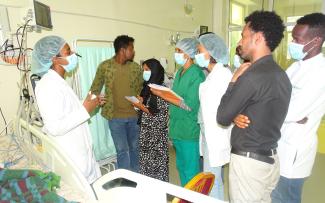BACKGROUND
Tuberculosis (TB) is the leading infectious killer in Ethiopia, caused by one of the most “destructive pathogens on the planet”, mycobacterium tuberculosis. Despite being preventable, treatable, and curable, this disease kills 19,000 people in Ethiopia every year, more than HIV and malaria combined. The major causes of TB morbidity and mortality are lack of access to early diagnosis, treatment, and prevention services, and co-infection with other diseases, such as HIV/AIDS and Diabetes Mellitus(DM), as well as limited capacity to diagnose and manage multi-drug resistant (MDR) TB.
To combat TB in Ethiopia, USAID increases the availability of and demand for TB and MDR-TB prevention, care, and treatment services. As a result, TB deaths have dropped significantly from 66 per 100,000 population in 2010 to 16 people per 100,000 in 2021 and still it continues to be the leading infectious killer in Ethiopia. With USAID’s continued support, Ethiopia has reduced the incidence of TB by 31 percent from the 2015 baseline and Ethiopia's TB and MDR-TB treatment success rate is beyond the global average with over 90 percent and 75 percent respectively.
USAID continues to build upon this progress under the new Global Tuberculosis Strategy (2023-2030). Ethiopia is one of 24 high priority countries for provision of increased technical support, strengthening of local capacity to sustain programs, and advancing research and innovations to adapt or develop new tools and technologies. USAID also leverages public-private partnerships to expand access to standard TB and MDR-TB services; has helped establish centers of excellence at national and regional levels to diagnose TB and MDR-TB, serve as referral centers, and for capacity building; and helps ensure that TB patients receive immediate care and treatment.
PRIORITIES
The USAID Eliminate TB from Ethiopia project focuses on strengthening laboratory detection and diagnostic capacity in health facilities and expanding access to higher quality and patient centered care, including medications, to help patients overcome the disease in Tigray, Amhara, Oromia, SNNP, SWEP, and Sidama regions.
USAID’s Urban TB Local Organization Network activity builds the capacity of local organizations, health facilities, association of TB/MDR-TB survivors, and care providers to enhance their capacity to detect and treat TB and MDR-TB patients among affected and vulnerable populations in Addis Ababa, Dire Dawa, and Harar.
USAID Strengthening Resources for Technical Assistance (STAR) builds the capacity of national TB program experts and leadership to contribute to a self-reliant program that will lead and manage the national program with little or no external assistance.
The Tuberculosis Accountability Framework Agreement (TIFA) provides grants to local governments and organizations to initiate and maintain TB interventions with domestic resources.
Health system for TB (HS4TB) is an implementation mechanism that provides assistance to the Ministry of Health, National TB program, subnational TB program, and other line ministries on the implementation of the TB domestic resource mobilization roadmap, a multi-sectoral accountability framework to engage other actors to end TB in Ethiopia, as well as governance systems.

